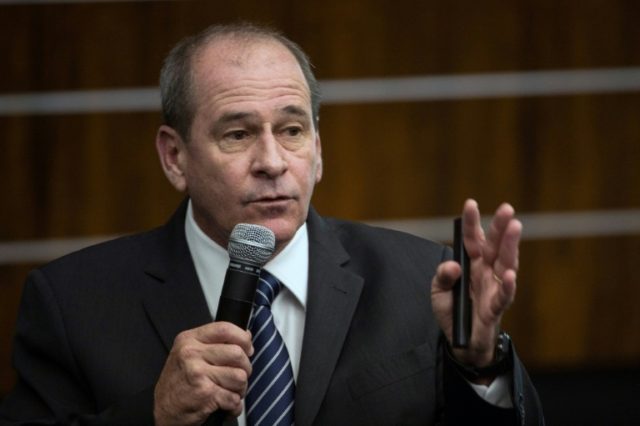Brazil’s President-elect Jair Bolsonaro has appointed retired army general Fernando Azevedo e Silva as the country’s defense minister.
As defense minister, Azevedo e Silva will take the helm of Brazil’s security situation at a particularly vulnerable time for the country given a volatile situation on its border with Venezuela, where thousands are attempting to flee the collapsed socialist state into Brazil regularly.
“Good morning! Today I am announcing that Army General Fernando Azevedo e Silva will fill the position of Minister of Defense,” Bolsonaro announced on Tuesday:
Bom Dia! Comunico a todos a indicação do General-de-Exército Fernando Azevedo e Silva para o cargo de Ministro da Defesa.
— Jair M. Bolsonaro (@jairbolsonaro) November 13, 2018
Azevedo e Silva, a retired four-star general who most recently served as a special advisor to Supreme Court President Dias Toffoli, has previously held high-powered positions such as head Olympic Public Authority in 2016 when Rio de Janeiro hosted the Olympic games and ran Brazil’s U.N. peace mission to Haiti that began in 2004.
A former paratrooper, he trained at the same academy as Bolsonaro in the 1970s during Brazil’s military dictatorship and is now the third member of Bolsonaro’s cabinet with a military background. Other appointees include retired general Augusto Heleno as his minister of institutional security and astronaut and former air force pilot Marcos Pontes as minister of science and technology.
The presence of military figures in Brazil’s Congress also rose significantly in October’s general election. Brazilians voted 35 military veterans into Congress, 31 deputies and four senators, compared to just 18 in the previous legislature.
Brazilian leftists who opposed Bolsonaro have stoked fears that Bolsonaro, himself a retired army captain, plans to return Brazil to a military dictatorship, which Brazil experienced for most of the second half of the 20th century. Bolsonaro has previously spoken in positive terms about the military era, describing it as a “glorious” period in the country’s history while playing down the extent of its human rights abuses.
However, many top-ranking military officials have played down fears that Bolsonaro aspires to undo Brazil’s democracy, including Augusto Heleno, who dismissed such claims as “nonsense.”
“That is so much nonsense — it is not even worth considering,” he told the Financial Times when asked about a return to military rule. “The country invests a lot in its military in terms of intellectual preparation, strategic knowledge, political knowledge and principally knowledge of Brazil.”
Senior general and Army Commander Eduardo Villas Bôas backed this view, affirming the military will not exercise unconstitutional power.
“The military has been absent from politics since 1985, after the end of the military government, and that’s how it intends to maintain itself, independent of whether the president-elect is a retired captain from our Brazilian army,” he said. “The idea of him as a man of service comes from outside. He is more politician than anything else. We are cautious with this notion that his election means the military is back in power. That is not the case.”
Brazil’s military faces significant challenges, principally in managing the ongoing migration crisis stemming from Venezuela. Military personnel are regularly deployed to help control the migration flows and help re-locate migrants from northern Brazil into less populated areas.
In 2016, the military also carried out its largest operation in the country’s history, as around 220,000 troops waged a nationwide campaign to help eradicate the Zika virus ahead of the Olympics, mainly through educating local residents and erecting mosquito to prevent its outbreak.
Follow Ben Kew on Facebook, Twitter at @ben_kew, or email him at bkew@breitbart.com.

COMMENTS
Please let us know if you're having issues with commenting.